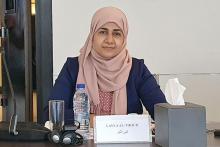As a human rights activist you’ve fought for fair treatment for prisoners and detainees in Yemen. Who inspired you to fight for the rights of others?
My mother was the one who inspired me. She was always helping others with everything – solving other people’s problems, from marriages to resolving disputes. I have always wanted to be like her.
Why are women being detained in Yemen and what are some of the challenges they face?
Yemen is now in its seventh year of civil war, compounded by a large-scale humanitarian crisis. Women political activists and human-rights defenders are being detained by all parties to the conflict. Innocent bystanders are also being captured and used as bargaining chips in prisoner-exchange deals.
Since the conflict broke out, I’ve witnessed people hitting women with sticks and electric batons, stepping on women, pushing them, and taking them to police stations by force.
Often these women disappear after being detained, and no one defends them for fear of being charged or labeled as a traitor.
Some of their families don’t take them back after they are released, others marry them off or they end up on the street. In extreme cases, some women are killed by their families because of the shame. There are not many NGOs or shelters out there to support these women. Many of them go to Egypt. But what happens afterwards? No jobs, no home and no family. Who is going to support them? This is why we have to work on preventing detention and imprisonment, rather than waiting for it to happen. Otherwise, we won’t be able to find adequate solutions until it’s too late.
What threats do women human rights defenders and activists face?
There is no guarantee of protection in this work. I’ve gone to prisons and met with prisoners and detainees. It wasn’t easy to do that, especially since I was the only woman going there. Sometimes, I had my team come with me. Or the prison guards would want to come with me and protect me, because the prisoners had not seen a woman in years.
I’ve had gunshots fired at my car and I’ve received death threats. In 2018, during an attempt to release women prisoners, I was detained at the prison. Thank God, in the end we succeeded, and we were all freed. For me, protection came not only from my sociopolitical position, but also from the support of people whose lives I impacted by freeing them from prison. I talked openly about the threats I was receiving, and they would accompany me on the streets and even surround me to protect me from gunshots and attacks.
You’ve faced such severe threats, you’ve even had to relocate to Egypt. What drives you to keep fighting for human rights?
When you believe in a case, you feel like you have to continue. At one point, when I was negotiating the release of a group of abducted women, I faced threats from the kidnapping gangs. People in power were also threatening me to stop.
At the same time, there are many stories that encourage me to do more even if it is dangerous for me. For example, one of the girls I helped get released from her kidnappers contacted me last week. She is getting married in Egypt. She told me she will never forget that without my help, she would not be where she is in life today. This makes me want to continue.
What can the international community do to support human rights defenders like you?
All parties to conflict care about the opinion of the international community. If women are threatened, media and international organizations can amplify their voices and encourage governments to uphold the law.
Additionally, if we want women to participate, we need to support them with resources through platforms such as the Compact on Women, Peace and Security and Humanitarian Action.
When I entered politics, our party was the first to be created and led by a woman, but before that, women were primarily involved in tokenistic positions. Throughout my career, I advocated the inclusion of women in leadership positions. Sadly, since 2015, many of the parties are actively excluding women once again from decision-making roles.
We also need to increase the diversity and number of women in negotiation and mediation. The international community often focuses on a small group of experts, and although the work of these women is important, we need to expand the circle further. There are many women actively involved in politics, human rights and peacebuilding, who should be included. Additionally, the expertise and lived experience of women is often underappreciated in comparison with academic credentials. The same tokenization applies to youth. We should reach out to diverse women, men and youth organizations with different expertise, teaching them to work in complicated contexts at the local and international level.
Finally, the international community should concentrate more on economic empowerment projects for women and youth. This will help increase their capacity to participate in peace processes. Every time we visit internally displaced person camps, many of the inhabitants tell us to support them with employment and not with humanitarian aid baskets.
